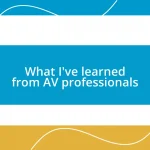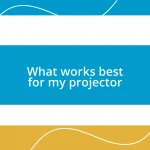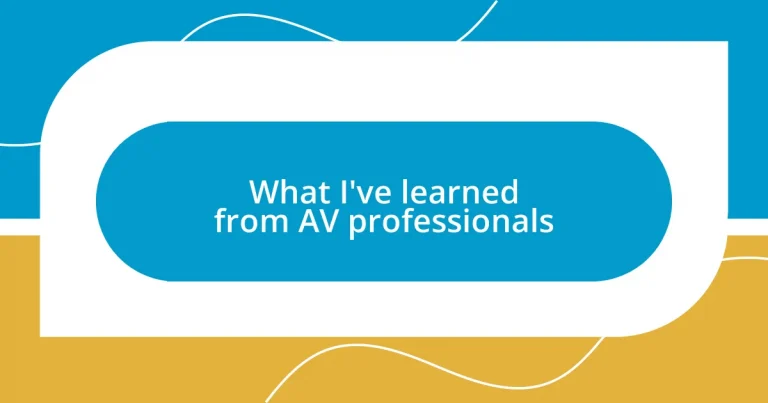Key takeaways:
- Adaptability and clear communication are essential for overcoming challenges in AV projects, highlighting the importance of flexibility under pressure.
- Key skills in the AV industry include technical proficiency, problem-solving, attention to detail, time management, and interpersonal skills, all contributing to successful event execution.
- Effective collaboration involves leveraging team strengths, establishing a shared language, and maintaining regular check-ins to enhance project cohesion and communication.
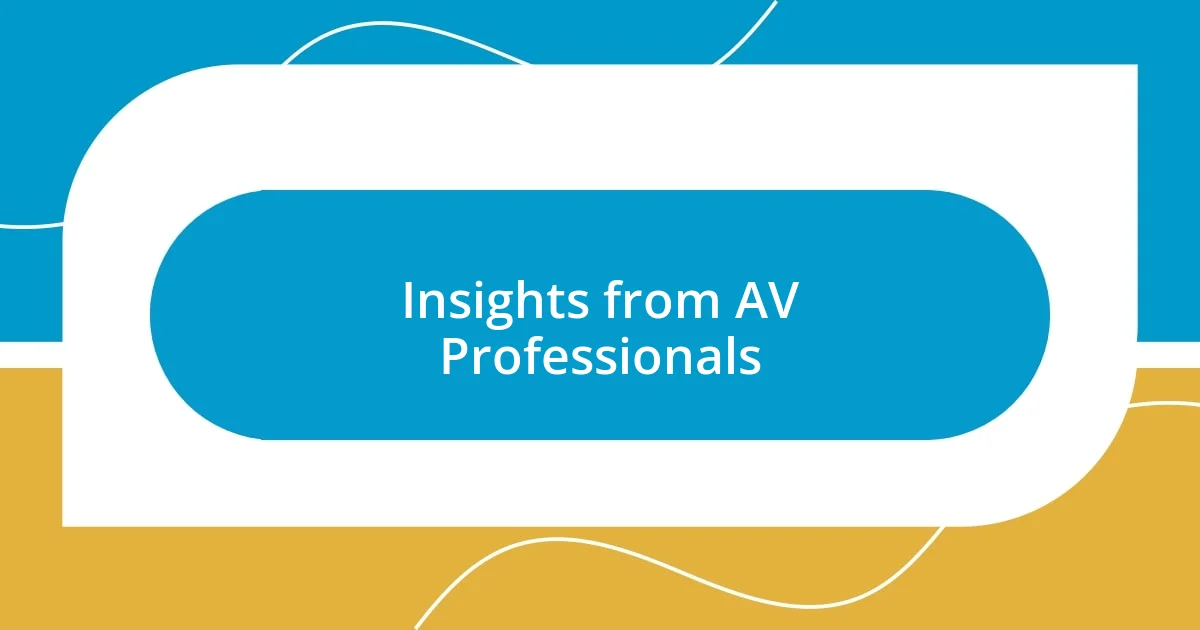
Insights from AV Professionals
One valuable insight I’ve gained from AV professionals is the importance of adaptability. I recall a time when an entire presentation was thrown off due to a last-minute technical glitch. The AV team quickly adjusted, showcasing not just their technical skills but their ability to think on their feet. How often do we find ourselves in situations where we must pivot? Their calm under pressure taught me that flexibility is as crucial as the technology itself.
Another takeaway resonates deeply with me: the significance of clear communication. I once observed an AV professional walk a client through equipment setup step-by-step, making the process feel seamless and reassuring. This approachable method transformed the experience from anxiety to confidence. Have you ever felt lost when facing unfamiliar equipment? I certainly have, and it’s clear that a little guidance goes a long way.
Lastly, collaboration emerged as a recurring theme in my conversations with AV experts. They emphasized that successful events are a team effort, where everyone’s input matters. I vividly remember one AV professional sharing how brainstorming sessions led to innovative solutions during a complex project. It made me appreciate that creating impactful experiences isn’t just about technology; it’s about fostering connections and teamwork. Isn’t that a refreshing perspective?
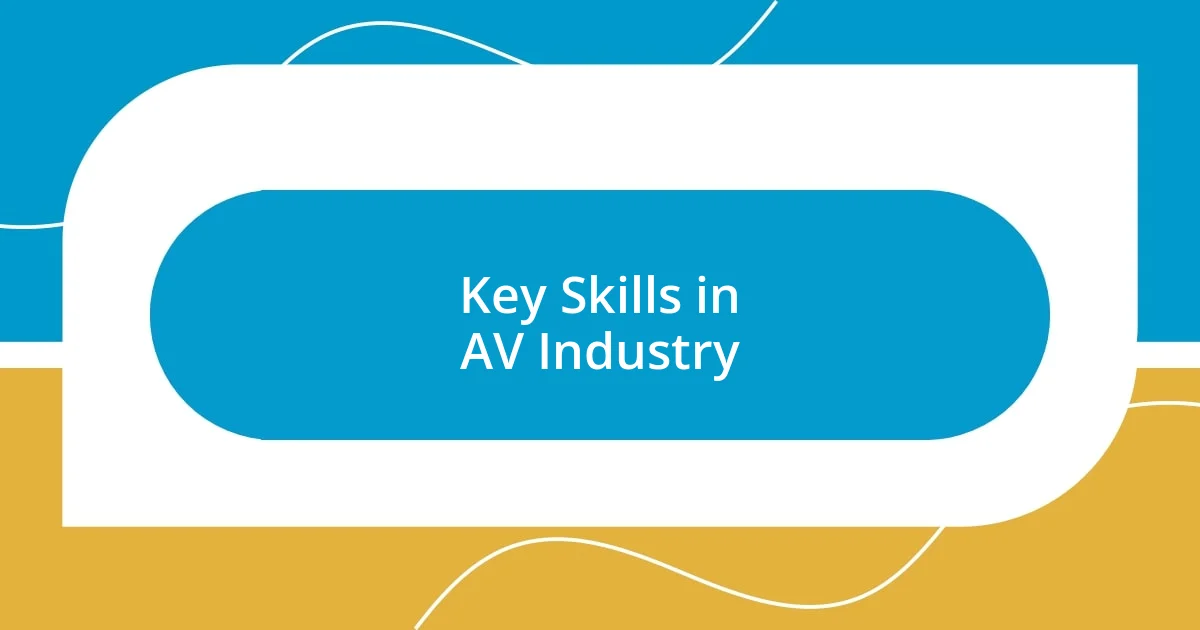
Key Skills in AV Industry
In the AV industry, technical proficiency stands out as a fundamental skill. This isn’t just about knowing how to set up equipment; it involves understanding the nuances of sound, lighting, and visual technologies. I remember an event where the sound engineer expertly balanced audio levels for a live band, ensuring every note resonated perfectly. It left me in awe of how crucial these skills are for crafting memorable experiences.
When I think about key skills, several come to mind:
- Technical Proficiency: Mastery of AV equipment and software.
- Problem-Solving: Quickly finding solutions to unexpected issues.
- Attention to Detail: Ensuring every element is just right for seamless execution.
- Time Management: Effectively coordinating schedules and tasks during events.
- Interpersonal Skills: Building rapport with clients and team members.
Each of these skills not only enhances the quality of the work but also ensures that the experienced team feels cohesive and united, as I’ve witnessed firsthand during various projects. The synergy created through these skills is what makes a successful AV event come to life.
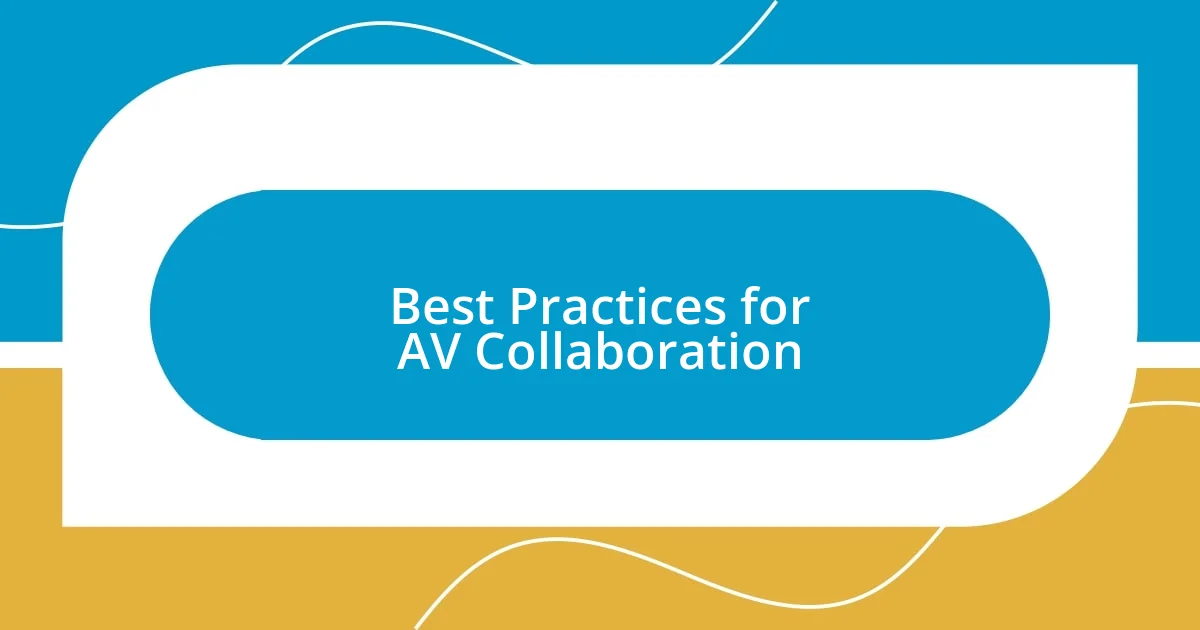
Best Practices for AV Collaboration
Collaborating effectively in the AV space requires an understanding of each team member’s strengths. I’ve noticed how important it is to leverage everyone’s expertise, be it lighting, sound, or video. For instance, during one event, our lighting expert had a unique vision for the ambiance. By integrating their insights with the audiovisual elements I was working on, we created a stunning atmosphere that exceeded everyone’s expectations. Isn’t it fascinating how combining different perspectives can elevate a project?
Another best practice involves establishing a shared language among the team members. I recall a project where we adopted a simple terminology to streamline communication. This made it easier to discuss technical issues without getting bogged down in jargon. As a result, the team operated smoothly, and our efforts felt more cohesive. Have you ever tried to work with a team that struggled with inconsistent terminology? If so, you likely understand how vital this practice can be in avoiding confusion and enhancing collaboration.
Finally, regular check-ins are a game-changer in maintaining good AV collaboration. I distinctly remember an instance where quick 15-minute stand-up meetings kept everyone aligned and informed throughout a busy event weekend. It fostered a sense of unity and minimized surprises. How often do we overlook the power of just a quick touch base? These small commitments can make a substantial difference in how smoothly a project unfolds.
| Best Practice | Description |
|---|---|
| Leveraging Strengths | Utilize each team member’s unique skills to enhance overall project quality. |
| Establishing Shared Language | Create consistent terminology to ensure clear communication. |
| Regular Check-Ins | Implement brief meetings to keep the team aligned and informed throughout the project. |
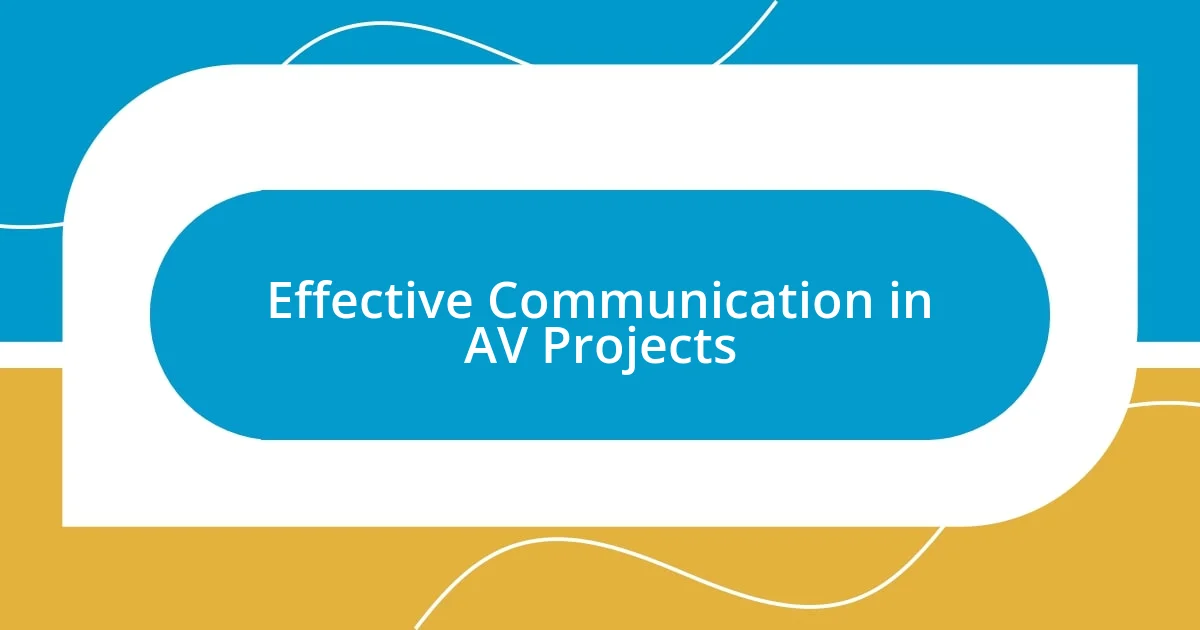
Effective Communication in AV Projects
Effective communication in AV projects is the backbone of a successful execution. I remember during a large conference, our team faced a last-minute change in the schedule. Instead of panicking, we quickly rallied together. By communicating openly about our new challenges, we managed to reconfigure the entire setup seamlessly. Isn’t it incredible how clear communication can transform potential chaos into organized success?
I’ve also found that being proactive in communication can prevent misunderstandings before they arise. On one occasion, we implemented a shared digital workspace where all team members could document their tasks. This not only kept everyone updated but also allowed us to foresee potential overlaps or gaps. How often do we miss opportunities simply because we assume everyone is on the same page? I believe it’s essential to break down those assumptions and create a culture where questions are welcomed, and clarity is prioritized.
Moreover, tone matters just as much as the content. When I was working on a particularly high-stakes project, I made it a point to check in with my team members individually, not just about tasks but also about how they were feeling. I could see firsthand how this simple act made them feel supported and valued. After all, isn’t teamwork about more than just completing tasks? When people feel heard and understood, it not only boosts morale but also enhances collaboration, fostering an environment where everyone can contribute their best ideas.
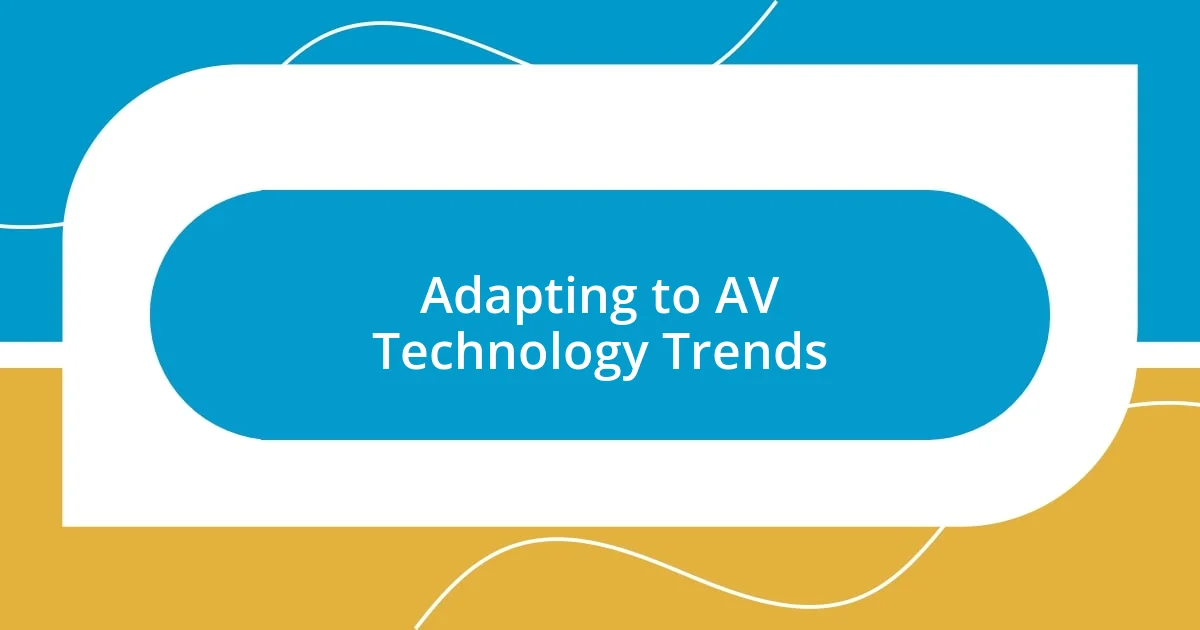
Adapting to AV Technology Trends
Adapting to AV technology trends has been an eye-opening journey for me. I vividly recall the first time I encountered 4K resolution at an industry expo. The clarity was astounding! I quickly realized that keeping up with advancements like this is essential. If you don’t adapt, you’re left in the dust, watching others impress clients with stunning visuals that don’t just capture attention, but evoke emotion. Have you faced a similar technological leap?
One strategy I found invaluable is embracing training opportunities. Last year, I enrolled in a workshop focused on augmented reality (AR) applications in live events. The hands-on experience opened my eyes to how AR can create immersive environments that resonate with attendees. I walked away excited, thinking about how I could apply these new skills to future projects. Imagining the possibilities was both exhilarating and intimidating—can you relate to that feeling of excitement mixed with a bit of trepidation when tackling new tools?
Additionally, staying connected with fellow AV professionals through online forums and social media has played a crucial role in my adaptation journey. Sharing experiences, tips, and even missteps fosters a sense of community and collective growth. Just last month, I participated in a discussion about the integration of AI in AV setups. It made me realize that we’re not alone in navigating these changes; we’re all riding the same wave. What advice have you received from peers that has helped you adapt to evolving trends?
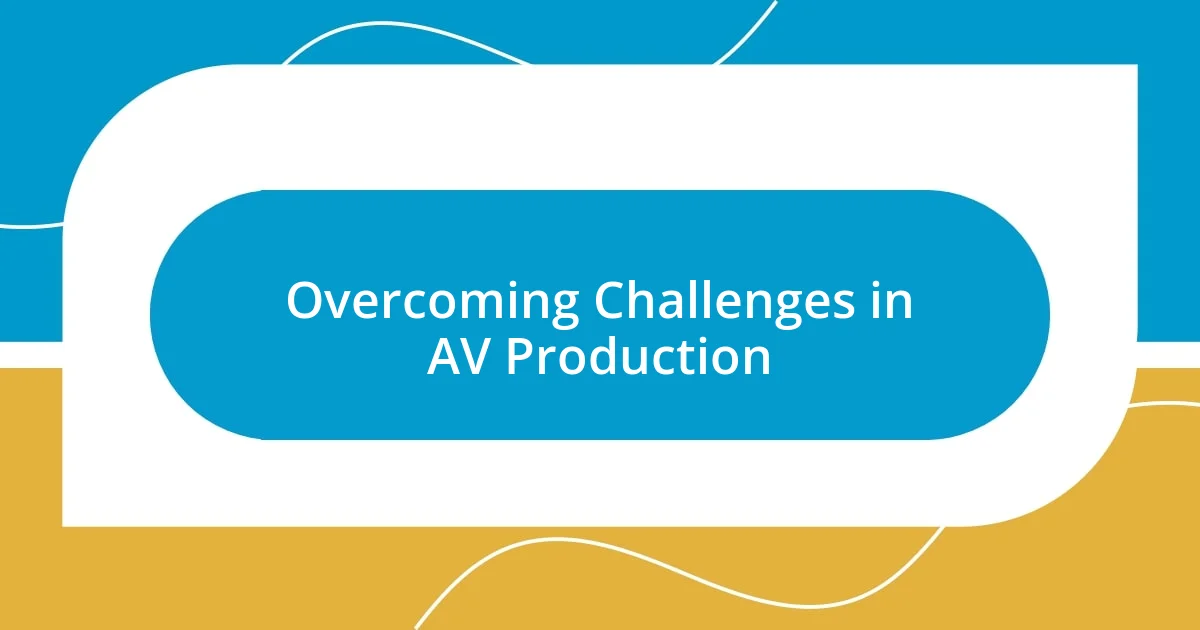
Overcoming Challenges in AV Production
One unavoidable challenge in AV production is dealing with unexpected technical failures. I remember a situation at a live event where the audio system suddenly cut out just as the keynote speaker was about to begin. Instead of letting the panic set in, our tech lead stepped in with calm confidence, directing the team to troubleshoot quickly. My heart raced as we worked together under pressure, and it was a stark reminder that staying cool in the face of adversity can transform a crisis into an opportunity for teamwork and ingenuity.
Another aspect I’ve learned is the importance of preparation and redundancy. During a major corporate event, we had backups for nearly everything—microphones, projectors, you name it. When one of our projectors failed unexpectedly, we seamlessly switched to the backup, and I couldn’t help but feel a surge of relief and pride in our foresight. Isn’t it amazing how a contingency plan can turn a potential disaster into a smooth sailing experience? I’ve found that making these preparations is not just about minimizing risk; it’s about going into every project with confidence and the ability to adapt quickly.
Finally, managing client expectations is an ongoing challenge that requires tact and understanding. I recall a project where the client had a very specific vision, but we faced constraints with time and resources. Rather than saying no outright, I arranged a meeting to discuss the limitations candidly while offering alternative ideas that would still meet their goals. It was rewarding to see the client’s initial disappointment shift to excitement as we collaboratively reimagined their vision. Have you ever had to balance client desires with realistic possibilities? For me, those moments of honest dialogue strengthen the relationship and ultimately lead to more successful outcomes.
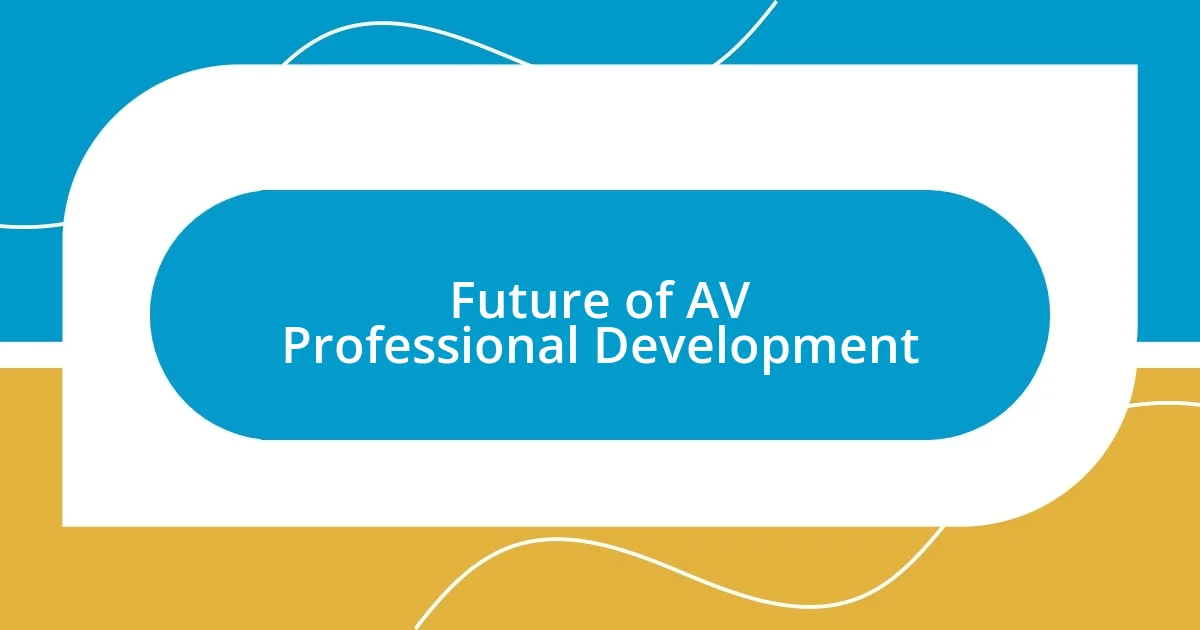
Future of AV Professional Development
Looking ahead, the landscape of AV professional development is evolving at a rapid pace. Recently, I attended a virtual conference where the emphasis was on upskilling for emerging technologies like virtual reality (VR) and machine learning. It struck me how critical it is to embrace these advancements; the future really demands a skill set that goes beyond traditional AV knowledge. Have you thought about what skills you might need to thrive in this changing environment?
Networking is becoming even more pivotal in this field, especially through platforms like LinkedIn and dedicated AV groups. I often find myself connecting with professionals from diverse backgrounds, sharing insights and best practices that enhance our collective knowledge. Just last week, I gleaned valuable tips from a fellow AV technician who specializes in live streaming, reshaping my approach to remote event production. It’s fascinating how these connections can lead to unexpected learning opportunities—what surprising lesson have you learned from a networking encounter?
Moreover, certification programs specifically tailored for AV technology are on the rise, offering structured paths for continuous improvement. I recently committed to pursuing a certification in digital media production, which I believe will set me apart in the industry. The experience has been both challenging and inspirational, pushing me to refine my knowledge while gaining confidence in my abilities. Have you ever felt that drive to elevate your credentials? Those moments of self-improvement remind me that professional development is a lifelong journey, one filled with opportunities to learn and grow.



